The First Political European Commission Will Work for Triple A Social Rating
Adelina Marini, November 7, 2014
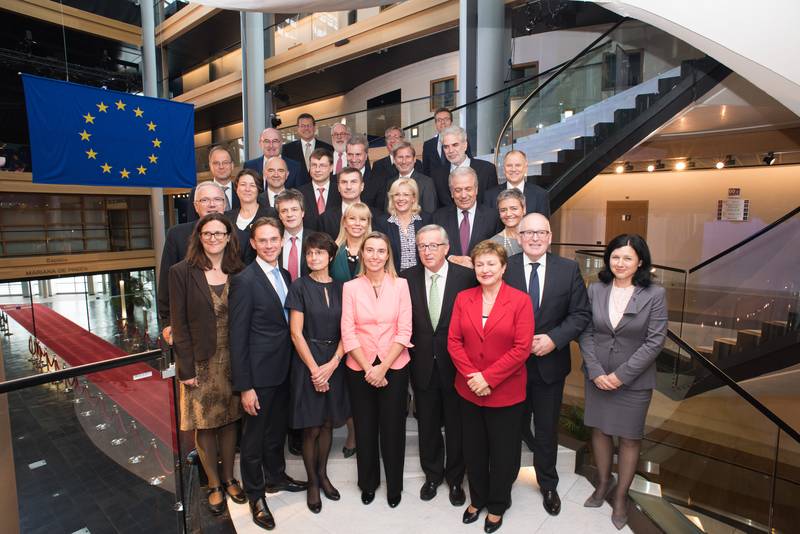 On 1 November, the new and quite different European Commission has started work, led by the veteran European politician Jean-Claude Juncker. This is the date that marks the beginning of a huge change in the EU toward creation of genuine European politics. Should this be perceived in some member states as further giving-away of national sovereignty will show to what extent are they actually in line with their own commitments, the European values and their citizens' interests. Juncker's Commission has been approved after a passionate debate in the European Parliament, which clearly revealed the changed situation in the new Parliament. The Commission was supported by 423 MEPs or 61% of those who voted, against it were 209 people (30%) and 67 MEPs abstained, but there were many party "rebels". 317 votes were needed so the Commission be approved.
On 1 November, the new and quite different European Commission has started work, led by the veteran European politician Jean-Claude Juncker. This is the date that marks the beginning of a huge change in the EU toward creation of genuine European politics. Should this be perceived in some member states as further giving-away of national sovereignty will show to what extent are they actually in line with their own commitments, the European values and their citizens' interests. Juncker's Commission has been approved after a passionate debate in the European Parliament, which clearly revealed the changed situation in the new Parliament. The Commission was supported by 423 MEPs or 61% of those who voted, against it were 209 people (30%) and 67 MEPs abstained, but there were many party "rebels". 317 votes were needed so the Commission be approved.
The Commission of last chance
The former prime minister of Luxembourg, with a huge experience at the European stage, said in front of the MEPs that the new Commission will be of the last chance because if there is no change the EU would no longer have the chance to consolidate, the future will be grim, volatile and uncertain. Mr Juncker spoke in Strasbourg in the end of October confidently, he was swimming in his own waters and perfectly knew which are the sensitive topics for the European Parliament. Nonetheless, during the vote, narrow party and national interests prevailed, but about this in a short while. The approval of the new composition later by the member states' leaders, at their autumn summit in Brussels on 23-24 October, marked the end or, rather, the beginning of a new political process in the EU - the way the members of European institutions are elected.
For the first time, this year has been introduced the procedure for nomination of candidates for European Commission president by the European political families, the so called Spitzenkandidaten procedure, which caused serious resistance in the EU and high tensions between the member states and Britain. It was the European Parliament's initiative and was silently supported by the leading powers in the European Council. However, it is just the first step toward creation of genuine European democracy in terms of election of leaders of key European institutions, which revealed a deficit of European thinking in the member states. If, by now, the appointments of members of the Commission used to pass, although sometimes with problems, smoothly and unnoticeably, the situation now is much different and will impose a brand new pattern of behaviour of the capitals.
So far, the tradition was the member states, or more precisely the ruling majorities, to nominate candidates for European commissioners according to various criteria - be it personal merits, party awards or simply on the basis of competence. Mr Juncker, however, imposed entirely new criteria by demanding the capitals to send not simply someone but competent people who are capable of solving specific problems. Not all member states responded. For the purpose he proposed a scheme of the new structure of the Commission which represents a real evolution of the European governance and reveals Jean-Claude Juncker's skills to take out the maximum of otherwise clumsy rules - in this case, out of the obligation the members of the Commission to be 28 he managed to create (at least at first sight) an effective machine that is working in teams. Something that, if it works, will secure him a place in the European history. The structure and portfolios required the member states to overcome the narrow party and strictly national interests and to table candidates who can contribute to resolving common European problems.
When the Lisbon treaty was negotiated, the member states agreed to work for reducing the number of commissioners in order to make the Commission more efficient given the enlargement and the impossibility each member state to get a portfolio that will make sense because the bigger the number of the member states the more inefficient the EU institutions become. Fully aware that they would not have the will to realise this decision they left a door through which they escaped. As of 2014, the Commission was supposed to have tangibly less members, but the member states voted against it, thus keeping the number the same as the number of the EU member states. Through the new structure, Jean-Claude Juncker not only managed to overcome the sluggishness stemming from the big number of commissioners, but also the fact that some countries offered inappropriate candidates. This can seriously change in 2019 and Mr Juncker promised to do it, especially after the fiasco with Alenka Bratusek and the scandal surrounding Tibor Navracsics's nomination.
Apart from creating cohesion between the different portfolios and members, Juncker said he had realised his promise to make the Commission a political body. "I want a political, executive Commission at the service of the common good and of Europe's citizens", he said in front of the MEPs on 22 October. The consequences of this are yet to be revealed but certainly, once there is a beginning it will be very hard to make a step back to the previous untroubled attitude toward the European institutions and the common European politics.
The distribution of portfolios shows very clearly what is wrong in the EU
The crisis in the euro area and the entire EU has revealed the huge differences and levels of evolution of the member states in economic, social, political and societal aspect. Instead of going ahead with the integration that had before that gone step by step, in the EU began a process of internal pressure, division and lack of synchrony. Division lines have appeared between rich and poor, north and south, east and west, new and old, between everyone and Britain. The tension, especially in the euro area, has reached a scale that has put the very survival of the common currency at risk, but of the EU at large as well. That is why, the fact that Juncker has created a powerful economic team, focuses on the rule of law and the fundamental values, has the ambition to build an energy union and intends to concentrate on internal consolidation, means that he has a clear idea about what is wrong in the EU. He aims, if not entirely to repair what has been done, to at least begin a long process of reform and recovery to achieve internal consolidation - the so called "digestion of the enlargement". "I do not believe in miracles - there is no magic bullet or growth button to push in Brussels. Structural reforms, fiscal credibility and investment at national and EU level have to go hand in hand", he said and underscored that he will be unyielding in treating all member states as equals.
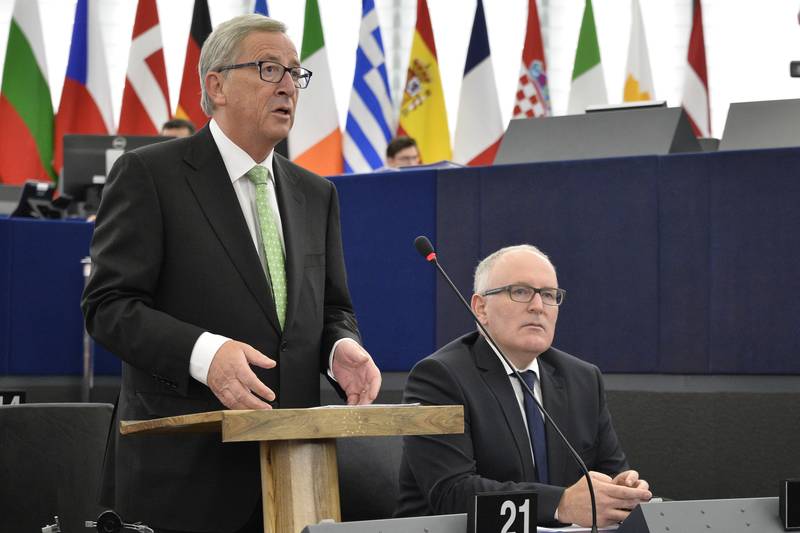 "It is time we had a real 'grand bargain', a broad coalition of countries and the main political parties who will work together on a three pillar structure: structural reforms, fiscal credibility and investment". The economy will be a central priority of the new Commission and this is seen from the many portfolios that have more or less something in common with it. In some cases, it seems that the portfolios overlap and this is going to be the biggest challenge for the new Commission - to what extent will its members be capable to work in a team as they persistently assured during their hearings in the European Parliament's committees. The key positions are held by two vice presidents - Jyrki Katainen and Valdis Dombrovskis who will coordinate the work of several commissioners, among whom with strategically important portfolios are the Frenchman Pierre Moscovici and the Belgian Marianne Thyssen.
"It is time we had a real 'grand bargain', a broad coalition of countries and the main political parties who will work together on a three pillar structure: structural reforms, fiscal credibility and investment". The economy will be a central priority of the new Commission and this is seen from the many portfolios that have more or less something in common with it. In some cases, it seems that the portfolios overlap and this is going to be the biggest challenge for the new Commission - to what extent will its members be capable to work in a team as they persistently assured during their hearings in the European Parliament's committees. The key positions are held by two vice presidents - Jyrki Katainen and Valdis Dombrovskis who will coordinate the work of several commissioners, among whom with strategically important portfolios are the Frenchman Pierre Moscovici and the Belgian Marianne Thyssen.
euinside has already presented to you Mr Dombrovskis, but not enough attention we paid on France's former minster of finance Pierre Moscovici and to the until recently one of the most active MEPs in the European Parliament's economic committee Marianne Thyssen. The idea Pierre Moscovici to be given a post that, at first sight, seemed it inherits the functions performed before the European elections by Olli Rehn (Finland), who made out of the portfolio a very powerful and influential position in the EU, appeared controversial. Olli Rehn has turned into something like a real finance minister of the EU and the euro area, who defined the fiscal and economic policies of the member states. He enjoyed huge respect and he was unyielding. Olli Rehn was good connoisseur of the European institutional machine because he was before that an enlargement commissioner. Therefore, he knew quite well the situation in the new member states, too.
The problem with Mr Moscovici was, generally speaking, the fact that he is a Frenchman. France is the country which, since Francois Hollande is in power, refuses to implement what had been agreed at EU level and whose economy is performing badly which causes concern in Germany and in the EU. The MEPs spent a large part of the three hours of hearing to hold Mr Moscovici accountable precisely for his record - how will he lead such a strategically important portfolio since he had failed as a minister of finance to put France's public finances in order.
The questions were pouring one after another and made Pierre Moscovici nervous to such an extent that he started excusing himself saying that he did not aim for this position but was nominated by the French government and that he was given this portfolio by Jean-Claude Juncker. Yet in his opening statement, he decided to focus on his love for the European project, which, in today's environment of growing euroscepticism, huge unemployment and weak economic growth, sounded cynically and irrelevant. In spite of his repeatedly stated assurances that he will act according to the rules and will apply them strictly toward all the member states, he failed to convince the MEPs and they rejected his nomination. However, because of the grand deal between the Socialists and the European People's Party, his nomination passed but the lack of confidence in his capabilities has remained.
His responsibility will be significantly smaller than that of Olli Rehn's. Pierre Moscovici will be responsible for the deepening of the integration in the euro area, for the implementation of the Stability and Growth Pact, for the review of the reform of the economic governance, for the structural reforms in the euro area and the development of a VAT system at EU level. In his portfolio is also the building and management of an efficient customs union. He will be only a part of Juncker's big economic team. Yet in his first activity as a commissioner, his political experience has been revealed. He presented, together with Jyrki Katainen, the autumn economic forecast of the European Commission. It was obvious, that between the two there was no good synchrony yet and it seemed as if Moscovici prevailed. Something he thinly exploited.
The Belgian commissioner, Marianne Thyssen (EPP), is one of the powerful members of the European Commission according to the criterion "irreproachability of the professional career. Generally, she spent her entire career as a member of the European Parliament. In the previous term of the EP, she was a rapporteur on several key dossiers that accompanied the reform of the Union's economic governance. She was a shadow reporter of the EPP on the two-pack (the legislation that increased the economic coordination in the euro area), she was a rapporteur also on the Four Presidents' Report on deepening of the integration in the euro area, as well as for the supervision of credit institutions. In her new capacity, she will be responsible for employment, social affairs and mobility - one of the most problematic areas in the EU and one of the main priorities of the new Commission. Her performance during her hearing in "her" economic committee, expectedly, went on smoothly and strongly. She knew very well what was expected of her because it was precisely what she expected of this portfolio herself.
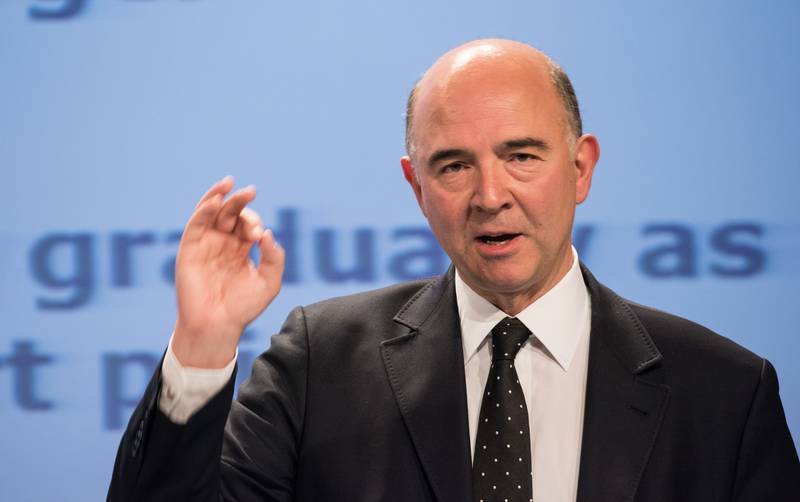 One of her most important priorities will be to make the employment policy better incorporated in the European semester. Many other portfolios in the new Commission are linked directly or indirectly to the economic portfolio, but their role is rather secondary. The leading figures in the economic team will be Jyrki Katainen, Valdis Dombrovskis, Marianne Thyssen and Pierre Moscovici. A team in which the right-wing views prevail as the first three are from the EPP and Mr Moscovici is from the Socialists and Democrats. The biggest challenge for Juncker will be to make this team to work together and to produce results so that he can realise what he promised to the European Parliament on 22 October, which is: to ensure that the member states will stick to the already agreed rules of the Stability and Growth Pact and that they will not seek to change them; to work for restoration of the excellent credit rating of the euro area countries; to boost investments; to tackle the unemployment.
One of her most important priorities will be to make the employment policy better incorporated in the European semester. Many other portfolios in the new Commission are linked directly or indirectly to the economic portfolio, but their role is rather secondary. The leading figures in the economic team will be Jyrki Katainen, Valdis Dombrovskis, Marianne Thyssen and Pierre Moscovici. A team in which the right-wing views prevail as the first three are from the EPP and Mr Moscovici is from the Socialists and Democrats. The biggest challenge for Juncker will be to make this team to work together and to produce results so that he can realise what he promised to the European Parliament on 22 October, which is: to ensure that the member states will stick to the already agreed rules of the Stability and Growth Pact and that they will not seek to change them; to work for restoration of the excellent credit rating of the euro area countries; to boost investments; to tackle the unemployment.
Currently, only two countries have an excellent rating in the currency block - Germany and Luxembourg, but for the latter Juncker said he was not quite sure how long will it remain excellent. Apart from the triple A credit rating, however, Juncker said he wanted a triple A social rating, whatever that means. According to him, without structural reforms there cannot be flexibility; the intergovernmental approach should not be prevailing; investments should increase. By Christmas, Juncker's Commission will present a detailed plan for investments worth 300 billion euros for which will be mainly responsible Jyrki Katainen. It is this plan that almost stumbled the approval of the former prime minister of Finland, because many of the MEPs, especially from the left part of the political spectrum, wanted to know where would the money come from to fund the plan. Katainen's answers, who did not seem to had given this plan a lot of thought, did not satisfy the Socialists and the far lefts because he said that not the entire amount of 300 billion will be liquidity or new funding, whereas they expected precisely this.
According to him, public money will be used only to boost private investments. This should not be considered as tabling of taxpayers' money for loose spending. The work of the European Investment Bank should be more efficient and also the surplus countries are expected to contribute to the plan. He proposed to work together with the European Parliament for the drawing of the plan and its funding. Ever since he announced it in the summer, the 300 billion package has turned into a central issue in the EU. This creates excessive expectations which is possible to preordain the failure of the programme. And its success is very important because, according to Juncker, the investment in EU has dropped with a little over 500 billion euros or by 20% since their peak in 2007. The lack of investment is one of the main reasons for the weak growth of the European economy.
Jyrki Katainen is the one to mainly deal with the investment package. In the new Commission, he received the portfolio of investment, jobs and competitiveness. In his recent statements, Mr Katainen has positioned himself as a strong supporter of fiscal discipline because of which he was fiercely criticised during his hearing in the European Parliament. The strongest attacks came from the far right regarding his position about Greece during his premiership. He said that his country was not the Wild West but a state that implemented reforms that led to success. Alas, Finland's current economic situation does not work a lot in support to his claims. During the presentation of the autumn forecast, it was quite clear what is the difference between Jyrki Katainen and Pierre Moscovici, which could materialise into a conflict line between the two. Although it is Katainen who will be responsible for investment, Moscovici focused more on it as a solution to enhance economic growth, whereas Katainen repeated that fiscal discipline is very important.
The impartial pedant Timmermans
Indisputably, Juncker's economic team will be the most important condition for the success of his term. In the past years, though, in the EU another problem has emerged - with the rule of law and the respect of the fundamental values and rights of the EU. That is why, it is very telling that Juncker has created a very powerful post in the Commission that will take care precisely of this. Frans Timmermans will be the second most important figure after Juncker. In addition to the fundamental rights and values, as they are formulated in Article 2 of the Treaty, he will be responsible also for the improvement of the regulation and will closely monitor the respect for the subsidiarity principle - national sovereignty to prevail over European decisions every time when there is no need of a common European decision. He will be responsible also for the new rule of law mechanism, will guide the work of the commissioners for justice and home affairs. One of his tasks will be to ensure transparency of the work of the Commission.
Frans Timmermans is a remarkable personality. Brussels insiders say about him that he has a very strong ego. During his hearing not by a specific committee but by the conference of presidents (a powerful body of the European Parliament), he radiated authority, knowledge and determination. Some were fast to picture him as the "grey cardinal". It is certain, however, that Mr Timmermans is not a behind-the-scenes man. In front of the MEPs, he demonstrated an excellent knowledge of several European languages - French, German, English, Italian. This provoked the Polish MEP and former commissioner Danuta Hubner to ask him to answer her question in Polish. During his three-hour long discussion with MEPs, he outlined several very important ideas that could have a huge impact on the relations between the Commission and the member states.
First and foremost, he said that he will begin immediate consultations so that within a year a list of harmful regulations is prepared. This is one of the conditions for the UK to stay in the EU, but is also a strong priority for the Netherlands which supported David Cameron's efforts for a reform of the Union. The second very important thing is that, according to Frans Timmermans, the commissioners should work directly with national parliaments. A very strong idea because it will give a chance the voice of Brussels to be directly heard in the capital cities and to establish channel for feedback. It is possible this to seriously strain the relations with the national governments who, in this way, will be deprived of the possibility to twist the information about what had been achieved at EU level to fit the current domestic political conjuncture, but will get the European Commission closer to its citizens.
"We have to be honest in the member states, too. We often blame the European legislation, but there are cases when the member states demand specific legislation from the Commission", he said during his hearing. The third very important thing is that he promised not to compromise with the human rights. "There is no cultural context in which violations of human rights can be tolerated", he said and recalled that all member states have signed the European Charter on Human Rights. In this regard, he 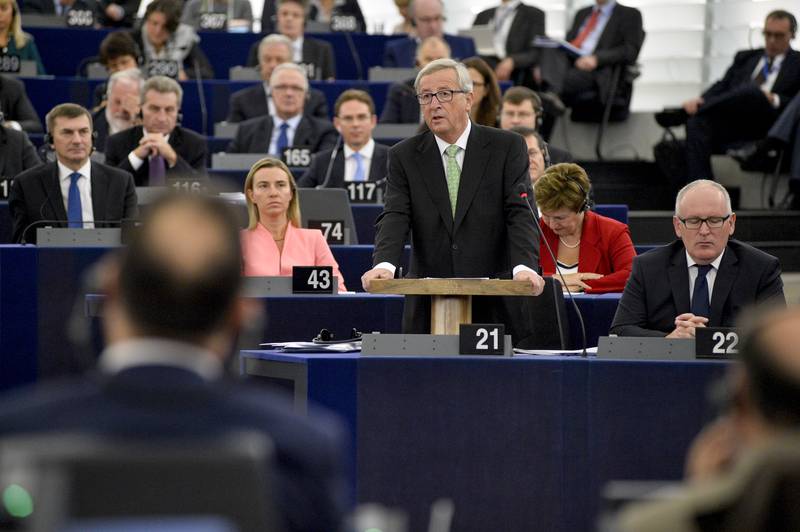 said something that deserves admiration in today's context. According to him, the right of same-sex marriage is part of the human rights.
said something that deserves admiration in today's context. According to him, the right of same-sex marriage is part of the human rights.
One of the most frequent questions to him was how will he proceed with Hungary which often violates the European values. Dialogue is the right approach, he said, but if it does not deliver results, we will continue with the measures. If necessary, Article 7 of the Treaty can be triggered (suspension of voting rights of a member state in the Council). So far, it has been mainly Hungary under the spotlight, but Frans Timmermans said that the fact that a single country is permanently in the news does not mean that others who violate the rule of law must be ignored. "We need to be pedantically impartial when applying the rules". Judging by Frans Timmermans's behaviour and his excellent knowledge of foreign languages, we can come to the conclusion that he will, indeed, be an impartial pedant in terms of rules. The success of his portfolio will be as important for the future of the EU as the success of the economic team.
We need a frank discussion about energy in the EU
The uneven economic development of the EU is, to a large extent, due to energy inequality. Some countries in the EU are extremely dependent on a single and unpredictable supplier of energy, they pay dearly for it and this holds their economic development back, whereas others are in a much more favourable position. Because of this inequality and often a conflict of interest, the EU has failed, even after the 2009 gas crisis, to agree on a common energy policy. But because of the Ukraine crisis, Polish Prime Minister Donald Tusk, who is the first Central European to be elected at a a high EU post - president of the European Council - proposed the creation of an energy union. Although they did not completely endorse it, the leaders of the member states after all agreed to go for such a union and Jean-Claude Juncker has turned into one of his main priorities and raised it to the level of a vice president of the Commission. Given the sensibility of the issue, it was really important who will take the post.
After the failure of Alenka Bratusek, the former prime minster of Slovenia, to perform competently during her hearing, the key post of a vice president for the energy union was given to the recent commissioner for inter-institutional affairs Maros Sefcovic (Slovakia). Not only he found a person who has an adequate background to take the vice presidential chair (Juncker wanted to put on these posts only former prime minsters, but Sefcovic has already one term as commissioner and vice president of the Commission, which raises him to the same level), Juncker obviously insisted this portfolio to be given to a Central or Eastern European.
Maros Sefcovic was heard literally on the eve of the debate of the composition of the new Commission in the plenary on 22 October. This was his second hearing in two-weeks' time because he initially appeared as a candidate for the Transport portfolio. His place has been taken by the second Slovene nominee - Violeta Bulc - and Mr Sefcovic will take the very sensitive issue of the energy union. He was not very detailed in his answers before the relevant committees but the MEPs were tolerant because of the too short a period for preparation. Nonetheless, he demonstrated impressive punctuality in identifying the weak spots and conveyed important messages.
Maros Sefcovic started his statement with the words that 25 years have passed since the fall of the Iron Curtain and the benefits of overcoming Europe's division are now visible. A very eloquent message against the backdrop of the feeling of a new Cold War and a new division along the same axis - between Russia and the West. "I will never forget the winter of 2009, when Slovakia literally plunged into darkness. For over two weeks the economy was at a standstill, factories closed and energy was provided only for households and hospitals. You know very well that Slovakia was not the only country in such a situation. I am convinced that, without European solidarity and almost immediate European assistance, the consequences would have been horrible. Therefore, it is our solemn duty to make sure that our citizens do not face such a situation again", Mr Sefcovic told the MEPs. Moreover, he added that Russia is using more and more gas deliveries as a tool for pressure and as a political weapon against Ukraine and other countries that want to assist Ukraine.
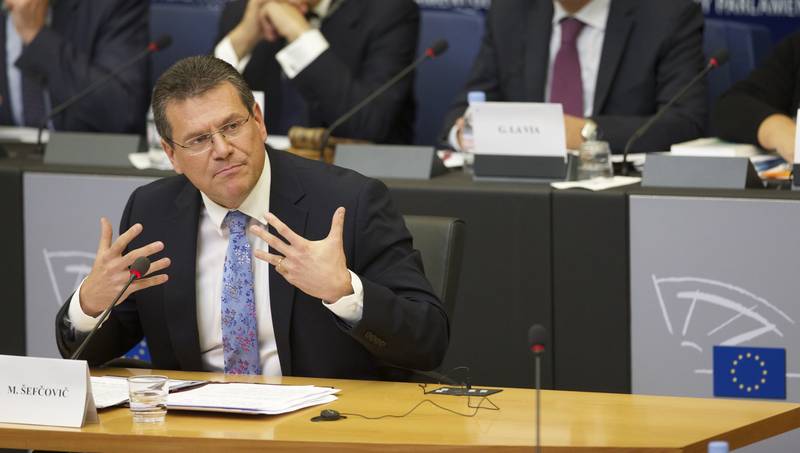 Maros Sefcovic proposed the energy union to be built upon five pillars: security, solidarity and trust; competitive and completed internal market; consumption modesty; decarbonisation of the energy mix; and research and innovation. According to him, it is high time to hold an honest conversation about how the prices of electricity are formed in the EU. Sefcovic said another very important thing - real coordination means that no member state will be able to modify its energy system without prior consultation with its partners and without having analysed the potential consequences for their systems. His main message was that the EU is a huge energy consumer and a huge market.
Maros Sefcovic proposed the energy union to be built upon five pillars: security, solidarity and trust; competitive and completed internal market; consumption modesty; decarbonisation of the energy mix; and research and innovation. According to him, it is high time to hold an honest conversation about how the prices of electricity are formed in the EU. Sefcovic said another very important thing - real coordination means that no member state will be able to modify its energy system without prior consultation with its partners and without having analysed the potential consequences for their systems. His main message was that the EU is a huge energy consumer and a huge market.
The Union imports 53% of its energy at a price of 400 billion euros per year. "We are the biggest energy customer in the world. Do we behave like that? Do we pull our international weight accordingly? Are we able to push for fairer prices and more balanced market conditions? Definitely not". All this was completely enough to approve Sefcovic's nomination without any objections. His portfolio will be one of the toughest, but if the foundations of the energy union are laid this will be one of the biggest achievements of the EU in decades.
Internal party rebellions in the European Parliament
The debate and vote of the composition of the new Commission drew a very different parliamentary picture. If in the previous parliament the irrational voices were a few and came predominantly from Nigel Farage's group Europe of Freedom and Democracy, in the new term, as a strong opportunistic group has emerged the European Conservatives and Reformists (ECR), who are now the third largest group. The reason is that the tone of the British Conservatives, under the David Cameron's leadership, has significantly sharpened in the past year and a half because of the fierce competition domestically with Mr Farage's Independence Party (UKIP).
The ECR leader Syed Kamall (Britain) spoke highly positively about the new Commission. The group welcomes the new structure because, according to them, it does not seem to simply seek jobs for 28 people. The Conservatives and Reformists also like that the Commission is trying to reduce bureaucracy and to complete the single market. "We're impressed by some appointments, like Timmermans's", he continued. However, the ECR are disappointed that their demand to create a post for budget control has not been taken into account and believe that Moscovici's appointment is a mistake. Kristalina Georgieva, the Bulgarian member of the Commission, is a vice president and is responsible precisely for the budget. Although the title of her portfolio does not explicitly say "budget control", this will be part of her main functions as it becomes clear from Juncker's mission letter. Furthermore, one of Ms Georgieva's main tasks will be to do the agreed mid-term review of the multiannual financial framework which makes the ECR's argument irrelevant.
Syed Kamall announced in the end that the position of his group would be to abstain during the vote. ECR, though, is the group with the highest number of "rebels", according to VoteWatch. Many of its members voted against, but there are also many who supported the new Commission. The second largest rebellious group was within the Socialists and Democrats, who are part of the grant parliamentary bargain. Many of them voted against the new Commission or abstained, as the Bulgarian MEP Georgi Pirinski did. Their rebellion, however, is easy to explain because many Socialists could not swallow Jyrki Katainen.
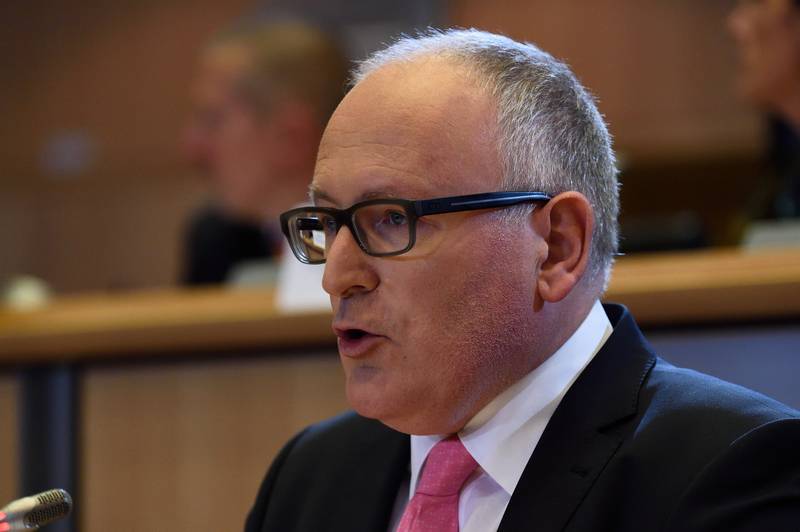 The outcome of the vote shows a serious inconsistency of the ECR, especially after the change of behaviour of the British Conservatives. There are parties in this group which are much farther right than the usual conservatism and there are also some frankly nationalistic parties, like the Bulgarian VMRO. Since the formation of the new Parliament, the Conservatives and Reformists behave just like David Cameron in the Council - irrational and often unsupported by argument opportunism, combined with a strong dose of nationalistic populism. It will be interesting to see whether the group will change its behaviour after the parliamentary elections in the UK in 2015.
The outcome of the vote shows a serious inconsistency of the ECR, especially after the change of behaviour of the British Conservatives. There are parties in this group which are much farther right than the usual conservatism and there are also some frankly nationalistic parties, like the Bulgarian VMRO. Since the formation of the new Parliament, the Conservatives and Reformists behave just like David Cameron in the Council - irrational and often unsupported by argument opportunism, combined with a strong dose of nationalistic populism. It will be interesting to see whether the group will change its behaviour after the parliamentary elections in the UK in 2015.
Internal and external consolidation
The hearings produced a very pleasant surprise. Federica Mogherini, who was appointed as High Representative for Foreign Policy and Security, refuted her critics and sceptics, among whom this website too, that she is too young and inexperienced to fit her role, especially at a time when a strong figure is needed on this post and when there is no common foreign policy and not even an agreement among the member states to build such. Her performance in front of the MEPs brings hope that Juncker's Commission has the potential to leave a mark in the building of a genuine common foreign policy. Still, Jean-Claude Juncker's inexorability to rename Johannes Hahn's portfolio remains a disappointment. Mr Hahn is responsible for the eastern policy and the enlargement negotiations.
MEPs from the European Parliament's foreign affairs committee insisted the word "negotiations" to be abolished, but when presenting the final composition of the Commission, Mr Juncker said that after careful consultations, "mainly with myself", he decided to leave the name because he does not want to delude the candidate countries that they can become members in the coming 5 years. These will be years of strong internal but also external consolidation. If the EU succeeds to involve both the candidate countries and the neighbourhood to consolidate their systems of values, the legal and economic standards, this could accelerate the achievement of their final goals - for some EU membership, for others prosperity and independence.
The composition, priorities and the leading figures in Juncker's Commission embody Jean-Claude Juncker's huge experience, his knowledge and skills. He is right that their responsibility is huge, but their potential is huge too. If Juncker succeeds, he will remain in history as that leader the EU so painfully needed in the past two decades - a leader of the scale of EU's founders.
 Federica Mogherini | © Council of the EU
Federica Mogherini | © Council of the EU | © Council of the EU
| © Council of the EU Luis De Guindos | © Council of the EU
Luis De Guindos | © Council of the EU